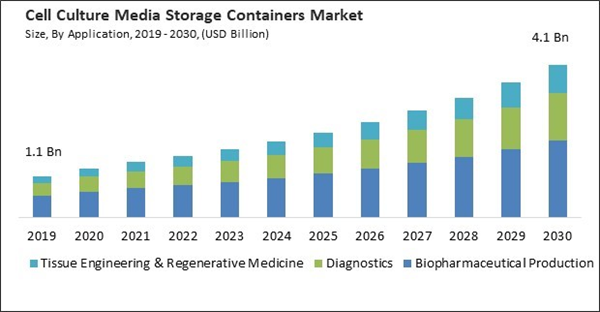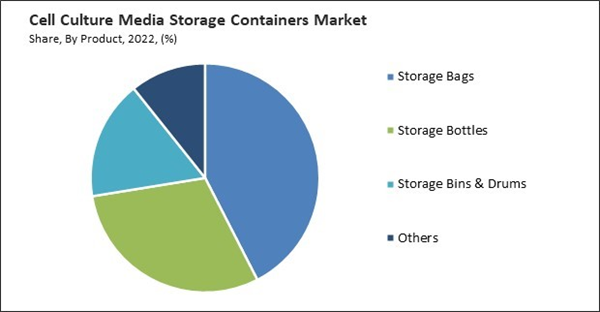The APAC region has seen remarkable growth in the biopharmaceutical industry. Countries like China, India, and South Korea have rapidly expanded their biomanufacturing capacities. As a result, the need for cell culture media storage containers for bioprocessing and manufacturing has surged. Therefore, the APAC region would account for more than 25% share of the market by 2030. The production of vaccines for various infectious diseases and pandemics has become a priority in the APAC region. Storage containers are essential for vaccine development, particularly in countries like India and China, which are among the major vaccine producers. Some of the factors impacting the market are growth of the biopharmaceutical industry, increasing focus on personalized medicine, and challenges in supply chain reliability.
The biopharmaceutical sector, which includes the development of biologics, monoclonal antibodies, and vaccines, has been growing rapidly. These containers are essential for maintaining the cell cultures required to produce these biopharmaceuticals. Biologics, complex therapeutic products derived from living organisms, have become a cornerstone of the pharmaceutical industry. Their production relies on cell culture techniques; thus, cell culture media storage containers are essential for maintaining the cell cultures. Advances in bioprocessing technologies have improved the efficiency and scalability of biopharmaceutical production. Bioreactors, bioprocess automation, and single-use systems have become integral to modern biomanufacturing, and storage containers play a key role in these technologies. Additionally, The shift towards personalized medicine has also driven advancements in the quality and regulatory compliance of cell culture media storage containers. Stringent regulations and standards for handling biological materials, including those used in personalized medicine, have spurred manufacturers to create containers that meet these compliance requirements. Consequently, the market now offers a range of containers equipped with enhanced features, including precise temperature control, contamination prevention, and optimal conditions for the storage of patient-specific cell cultures. This ensures that personalized medicine practitioners have access to reliable and compliant storage solutions, further fueling the growth of the market.
However, the reliability of the supply chain, including sourcing and distribution of storage containers, is crucial. Any disruptions in the supply chain can impact production schedules and the availability of containers. Supply chain disruptions, such as delays in sourcing raw materials or components, can lead to production delays for storage containers. Disruptions in the supply chain affect the strategic planning of both manufacturers and end-users. It may necessitate the development of contingency plans and the evaluation of alternative suppliers. Supply chain reliability is crucial in the market.
Product Outlook
By product, the market is categorized into storage bags, storage bottles, storage bins & drums, and others. The storage bottles segment covered a considerable revenue share in the market in 2022. Storage bottles are widely used for storing cell culture media. These media are critical for providing nutrients and maintaining optimal conditions for cell growth in laboratories, research facilities, and biomanufacturing plants. Many laboratory reagents, such as buffers, enzymes, and molecular biology solutions, require precise storage conditions. Storage bottles protect these reagents from contamination and maintain their stability.Application Outlook
Based on application, the market is classified into biopharmaceutical production, tissue engineering & regenerative medicine, and diagnostics. In 2022, the biopharmaceutical production segment witnessed the largest revenue share in the market. Biologics production necessitates cell cultures to express therapeutic proteins; media storage containers are essential for maintaining these cell cultures. The demand for vaccines has surged, driven by global health concerns and the emergence of new infectious diseases. Vaccine development and production heavily rely on cell culture techniques, and storage containers are integral for propagating virus strains and cell lines used in vaccine production.End-use Outlook
On the basis of end-use, the market is divided into pharmaceutical & biotechnology companies, CROs & CMOs, and academic & research institutes. In 2022, the pharmaceutical & biotechnology companies segment dominated the market with maximum revenue share. Biopharmaceutical sector has been growing rapidly, including biologics, monoclonal antibodies, and vaccines. These products require cell culture techniques and storage containers to maintain the cell cultures. As biologics production expands, the demand for storage containers increases proportionally. Monoclonal antibodies are widely used to treat various diseases, including cancer and autoimmune disorders.Regional Outlook
Region-wise, the market is analyzed across North America, Europe, Asia Pacific, and LAMEA. In 2022, the North America region led the market by generating the highest revenue share. North America is a global hub for biopharmaceutical research and manufacturing. The development and production of biologics, monoclonal antibodies, and vaccines have been significant drivers of the market. The growth of this industry has resulted in a sustained demand for advanced storage solutions. North America boasts numerous prestigious research institutions and universities at the forefront of life sciences research. These institutions use cell culture media storage containers for various experiments and studies, supporting the demand for high-quality containers.The market research report covers the analysis of key stake holders of the market. Key companies profiled in the report include Thermo Fisher Scientific, Inc., Merck KGaA, Danaher Corporation, Sartorius AG, Greiner Bio-One International GmbH, Corning Incorporated, Saint-Gobain Group, HiMedia Laboratories Pvt. Ltd., DiagnoCine, and VWR International, LLC (Avantor, Inc.).
Scope of the Study
Market Segments Covered in the Report:
By Application- Biopharmaceutical Production
- Diagnostics
- Tissue Engineering & Regenerative Medicine
- Storage Bags
- Storage Bottles
- Storage Bins & Drums
- Others
- Pharmaceutical & Biotechnology Companies
- CROs & CMOs
- Academic & Research Institutes
- North America
- US
- Canada
- Mexico
- Rest of North America- Europe
- Germany
- UK
- France
- Russia
- Spain
- Italy
- Rest of Europe- Asia Pacific
- China
- Japan
- India
- South Korea
- Singapore
- Malaysia
- Rest of Asia Pacific- LAMEA
- Brazil
- Argentina
- UAE
- Saudi Arabia
- South Africa
- Nigeria
- Rest of LAMEA
Key Market Players
List of Companies Profiled in the Report:
- Thermo Fisher Scientific, Inc.
- Merck KGaA
- Danaher Corporation
- Sartorius AG
- Greiner Bio-One International GmbH
- Corning Incorporated
- Saint-Gobain Group
- HiMedia Laboratories Pvt. Ltd.
- DiagnoCine
- VWR International, LLC (Avantor, Inc.)
Unique Offerings
- Exhaustive coverage
- The highest number of Market tables and figures
- Subscription-based model available
- Guaranteed best price
- Assured post sales research support with 10% customization free
Table of Contents
Companies Mentioned
- Thermo Fisher Scientific, Inc.
- Merck KGaA
- Danaher Corporation
- Sartorius AG
- Greiner Bio-One International GmbH
- Corning Incorporated
- Saint-Gobain Group
- HiMedia Laboratories Pvt. Ltd.
- DiagnoCine
- VWR International, LLC (Avantor, Inc.)










